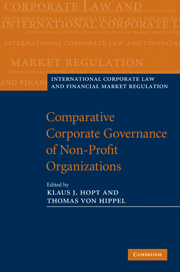Book contents
- Frontmatter
- Contents
- List of contributors
- Preface
- Abbreviations
- PART I Economic findings and theories on nonprofit organizations
- PART II The nonprofit sector: private law, trust law, tax law in selected countries
- PART III The board of nonprofit organizations
- PART IV Good governance of nonprofit organizations: activities and regulatory problems
- PART V Good governance of nonprofit organizations: self-regulation, disclosure and supervision
- 13 Self-regulation
- 14 Disclosure, reporting, auditing
- 14.1 Financial reporting by nonprofit organizations: United States developments
- 14.2 Charity Commission regulation of the charity sector in England and Wales: the key role of charity audit regulation
- 15 Enforcement by state supervision and tax authorities
- Index
14.2 - Charity Commission regulation of the charity sector in England and Wales: the key role of charity audit regulation
from 14 - Disclosure, reporting, auditing
Published online by Cambridge University Press: 05 August 2011
- Frontmatter
- Contents
- List of contributors
- Preface
- Abbreviations
- PART I Economic findings and theories on nonprofit organizations
- PART II The nonprofit sector: private law, trust law, tax law in selected countries
- PART III The board of nonprofit organizations
- PART IV Good governance of nonprofit organizations: activities and regulatory problems
- PART V Good governance of nonprofit organizations: self-regulation, disclosure and supervision
- 13 Self-regulation
- 14 Disclosure, reporting, auditing
- 14.1 Financial reporting by nonprofit organizations: United States developments
- 14.2 Charity Commission regulation of the charity sector in England and Wales: the key role of charity audit regulation
- 15 Enforcement by state supervision and tax authorities
- Index
Summary
Key features of the registered charity sector in England and Wales
The ca. 167,000 publicly accountable registered charities in England and Wales have a combined annual gross income of ca. £51 billion as summarised on the Charity Commission website, based on charities' accounts filed up to ten months after their financial year-end. In addition, there are many exempt charities, whose total income is thought to be much greater still. These are mainly the universities and colleges of the higher/further education sector and charities in the ‘social housing’ sector – both sectors being mainly grant-aided from public funds covered by specialised SORPs (Statements of Recommended Practice) and regulated by the relevant government agency. Together with the excepted charities (mainly those of the Church of England and the free church movement, also the numerous local Guides and Scouts charities for young people), they are thought to number ca. 100,000, though no reliable income estimates seem to be available for the latter.
Some £6 billion, nearly 90% of the registered charities' total income, is covered by statutory audit of the 9,250 largest charities to professionally regulated international auditing standards, with nearly all of the remaining 10% or more by value covered by statutory independent examination regulated in theory by the Charity Commission itself.
Sector research confirms that registered charities are administered by nearly a million charity trustees, many of them serving on more than one governing board (on average, charities have nine trustees each), and that they employ well over 500,000 paid staff, mostly earning some 25% less than the salaries of their commercial counterparts – except for skilled fund-raisers, for example, who in the intensely competitive world of charity appeals/events nowadays command a premium salary package.
- Type
- Chapter
- Information
- Comparative Corporate Governance of Non-Profit Organizations , pp. 849 - 895Publisher: Cambridge University PressPrint publication year: 2010



